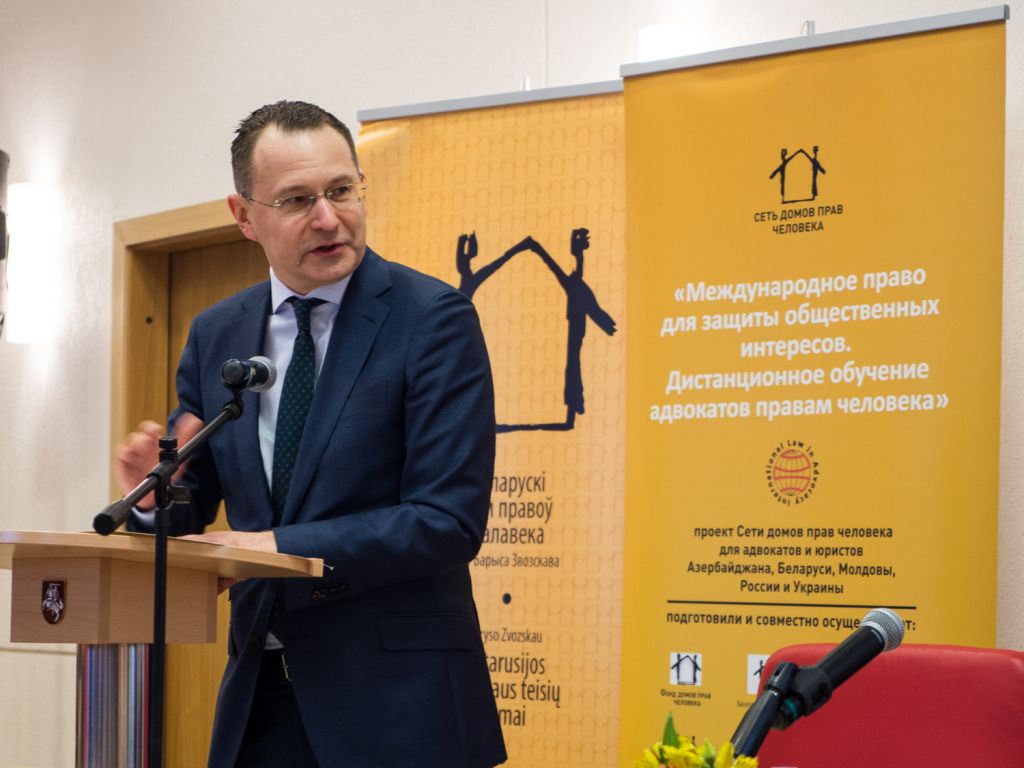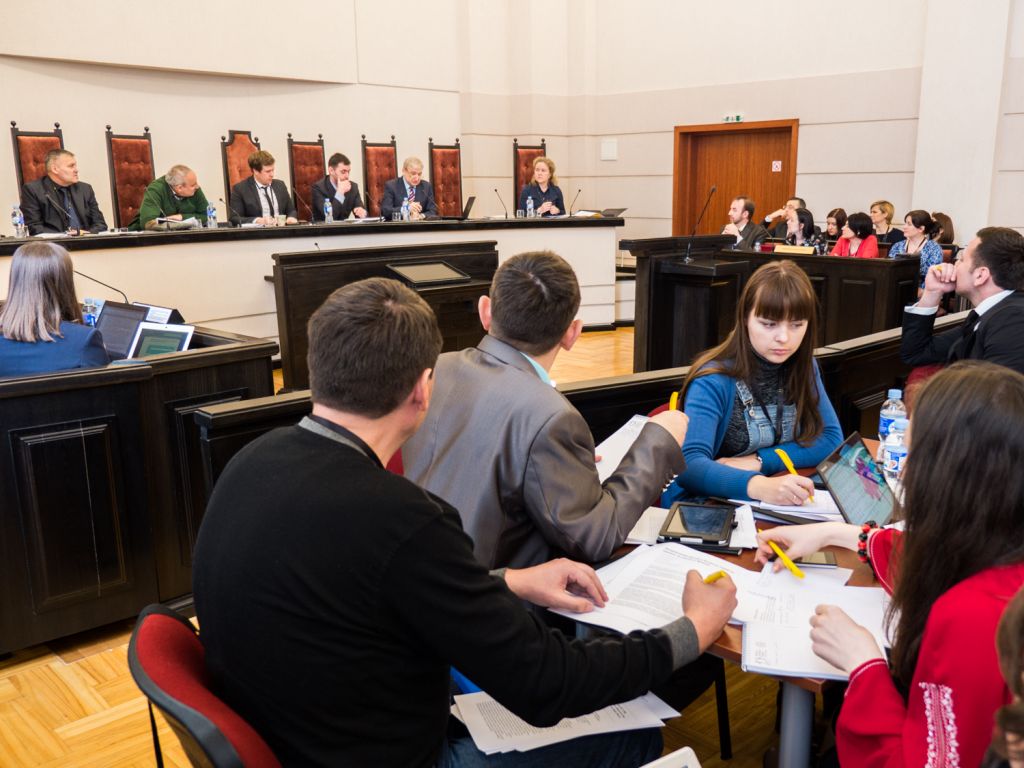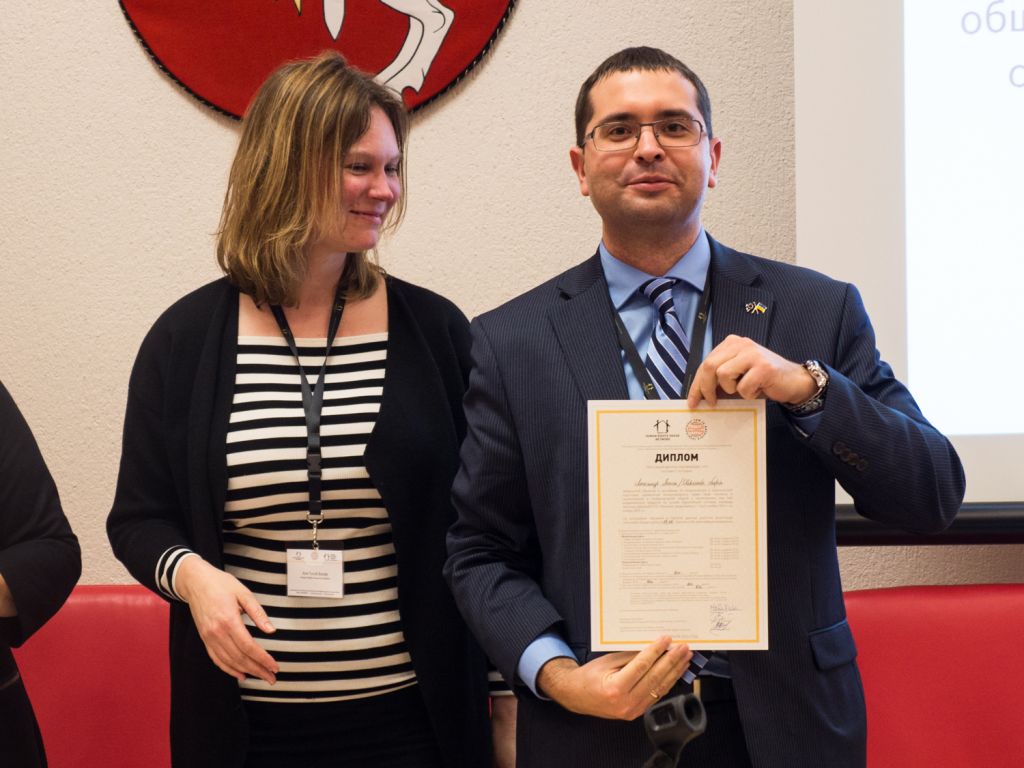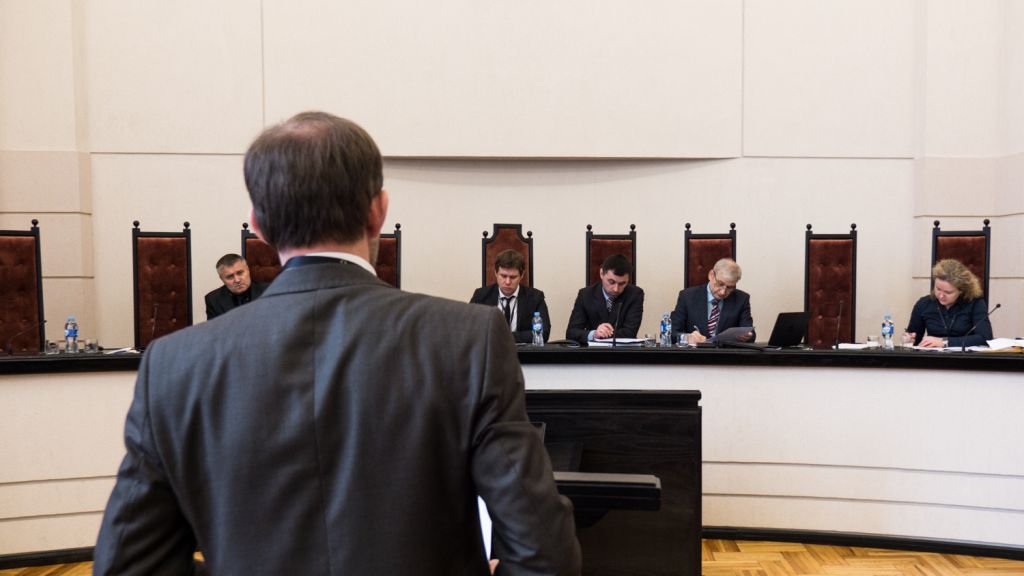The conference bought together experts, alumni, and participants from Azerbaijan, Belarus, Moldova, Russia, and Ukraine. For one year, they had engaged online in the ILIA distance learning program, collaborating on assignments and discussing different aspects of human rights law. The conference was a great opportunity for them to cement these relationships and form plans to work together, and to evaluate with experts and alumni the best ways to use the knowledge they have gained. Participants also of course celebrated their graduation into the ILIA community, and as many of them expressed, it was a great experience for them to meet with such like-minded legal professionals.
On the first day of the conference, Dainius Žalimas, President of the Constitutional Court of Lithuania, who kindly hosted the conference at the Court, stressed that the protection of human rights requires not only knowledge, but also courage: “Taking into account the problems currently facing civil society in Azerbaijan, Belarus, Moldova, Russia, and Ukraine, the lawyers, who are ready to actively defend human rights, are especially important to ensure that the situation changes for the better… Human rights belong to everyone, without exceptions. However, as long as people are not aware of these rights and do not see positive examples, the words ‘human rights’ are empty and meaningless.”

Dainius Žalimas, President of the Constitutional Court of Lithuania, speaking at the conference
Further, Dainius Žalimas expressed his belief that with the support and training of lawyers, the situation may change for the better: “The key factor in creating a harmonious, open, and democratic society is the freedom of every person to defend the inalienable rights and liberties without fear and repression. I believe that positive change is just a matter of time.”
Maria Ślązak, former President of the Council of Bars and Law Societies of Europe (CCBE), also spoke at the opening, expressing her admiration for ILIA lawyers: “Human rights lawyers are under threat. I’m am impressed by your commitment to continue to work on these issues; you are heroes in this room.”

Maria Ślązak, former President of the Council of Bars and Law Societies of Europe (CCBE), speaking at the conference
Following these introductions, participants were invited to the main courtroom of the Constitutional court, where they engaged in a moot court human rights case before the United Nations Human Rights Committee. Participants were split into three groups: the applicant’s defence, the state, and the Committee secretariat. Once they had taken their seats on opposing benches, they began to discuss how to advocate the case’s admissibility, or inadmissibility to the court. Meanwhile, ILIA’s team of legal experts took their seats behind the judges’ bench, ready to adjudicate the session and to later give their expert guidance on how the teams could improve their handling of the case. Once the issues of admissibility had been addressed, the participants contended the case on merit.
Some of the participants were already experienced in submitting cases to the UN Human Rights Committee and other international mechanisms, while for others the moot court was their first in-court experience raising a human rights case internationally.

ILIA participants engaged in moot court human rights case
On the second morning of the conference, the participants, alumni, and international experts discussed a series of issues essential to the successful implementation of international human rights standards and mechanisms. The first session focused on the role of constitutional courts in the process of implementation of international human rights standards at the national level, while the second elaborated on international mechanisms of protection and professionalization of human rights lawyers and in what circumstances it is best to use each respective mechanism.
In the afternoon, the community discussed possibilities for further cooperation and participation in the activities of human rights organisations, including member and partner organizations of the Human Rights Houses. Later, the session focused on advocacy, with the ILIA coordinators presenting how the national teams have implemented at the national level the recommendations of HRHN’s Human Rights Lawyers at Risk report – drafted with significant case-based input from ILIA lawyers.
A group of participants presented what the ILIA programme meant to them. Pavlo Parkhomenko, a Ukrainian judge, stated that the programme made him “crazy” and all his colleagues found him “mad” during the educational cycle – clearly pointing out that the curriculum is substantial and that the students get very involved and engaged in the course. The rest of the group emphasised the importance of meeting like-minded legal professionals and the eye-opening experience of learning about the different international mechanisms, giving them a whole set of new tools to defend human rights defenders and promote human rights.
Participants were then presented with their graduation certificates and invited to celebrate during a dinner with experts, alumni, and associates of the ILIA program.

Ane Tusvik Bonde (Regional Manager, Eastern Europe and Caucaus, Human Rights House Network; Oleksandr Lapin (Lawyer and recent ILIA graduate – Donetsk/Kiev, Ukraine)
The conference marked the end of the third cycle of the ILIA program, but the emphasis was not on activities coming to an end, but rather on a new phase of activities, in which lawyers become embedded in the human rights community and take local ownership of the goal to improve the implementation of international human rights standards.
The growing and exclusive ILIA alumni community continues to push for the implementation of international human rights standards, access to international mechanisms, and for strong, united advocacy on issues affecting the work of legal professionals in the human rights field.
International Law in Advocacy (ILIA)
“International Law in Advocacy” is a Human Rights House Network program to improve the professional knowledge and skills of lawyers from the Eastern Europe and South Caucuses region in the field of human rights, and to strengthen civil society in participating countries. The curriculum of the program has been successfully certified by the experts of the European Humanities University (EHU) and has been awarded academic credits in compliance with the European Credit Transfer and Accumulation System (ECTS). Courses focus on using the knowledge gained by students in advocacy work and in implementation in their home country. The program also fosters an active, international network of alumni lawyers. The ILIA program is sponsored by the Royal Norwegian Ministry of Foreign Affairs.





